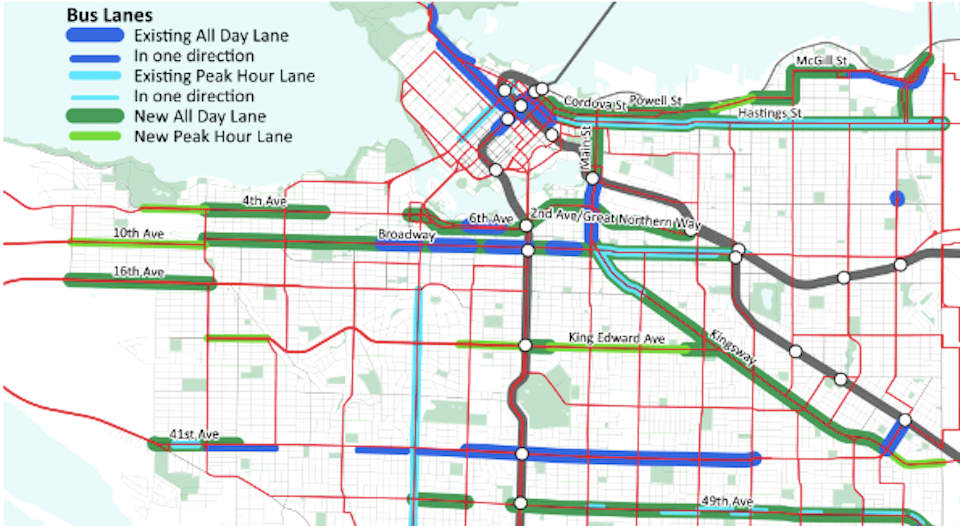Does the City of Vancouver need to rethink its bus lanes?
A Vancouver city councillor thinks so...and she's not alone.
OneCity Coun. Christine Boyle, numerous local commuters, and the regional transportation authority, TransLink, want to see more bus lanes on priority routes in the city.
On July 24, Vancouver city council will vote on a motion tabled by Boyle called “Taking urgent action to boost street capacity and speed up transit service for Vancouverites" that seeks to add dedicated bus lanes on eight major corridors through Vancouver.
With the Broadway Subway Project delayed an additional year, adding priority lanes in key corridors will provide commuters with faster alternatives. It is also possible to implement the changes next year, meaning they don't have to wait five or 10 years for a massive transportation overhaul, Boyle told V.I.A. on Friday afternoon.
"Dedicated bus lanes allow people to move around the city more quickly on existing streets," she noted, adding that they are a way to reallocate road space to save money, and time, and better serve the community.
Dedicated bus lanes quadruple the carrying capacity of the single travel lane
During the 2010 Olympics, dedicated bus lanes increased the capacity of the transportation system to quadruple the carrying capacity of a single travel lane.
Vision Zero Vancouver is a group advocating for zero deaths or serious injuries on Metro Vancouver streets and wants to see more bus routes available to commuters. It believes the proposed changes "would massively speed up commute times" and reduce congestion by encouraging more people to take transit.
Boyle said she was out with Vision members riding the #49 bus to UBC and they experienced numerous delays.
"It gets stuck in traffic and is much slower than it should be," she said. "In a neighbourhood like South Vancouver, [increased service] would offer a big benefit to residents."
According to the motion, transit delays may also disproportionately impact marginalized communities. Immigrants, visible minorities, and low-income earners rely on public transportation more often. South Vancouver, the neighbourhood highlighted by Boyle, is one of the most diverse parts of the region and heavily reliant on transit.
The city has been working to address overcrowding on Vancouver buses since November 2023. However, ridership and overcrowding have increased, leaving commuters stuck in traffic for 28,000 hours every weekday.
The motion notes that slow transit compels many locals to drive rather than take transit. Transit priority projects also have a successful track record in the Lower Mainland, resulting consistently in "five to 35 per cent reductions in travel times, a difference significant enough to typically increase ridership by four per cent to six per cent."
Overcrowding costs TransLink $80 million
Overcrowding on routes caused TransLink delays costing over $80 million in 2023. Its Bus Speed and Reliability report includes the Vancouver corridors mentioned in the motion and highlights that buses carry 60 per cent of transit users in the Lower Mainland.
A TransLink spokesperson told V.I.A. that the transit authority supports adding bus priority measures in key corridors of Metro Vancouver and supports efforts toward implementation.
"Measures such as bus lanes reduce travel time, increase reliability, and improve the efficiency of our transit system, helping more people get to where they need to go. Savings in operational costs achieved from such measures can be reinvested elsewhere in the system, with the launch of Route 80 last April as an example," it said.
The corridors highlighted in the motion include:
- Southeast Marine Drive
- 49th Avenue
- Hastings Street
- Main Street/Kingsway
- Broadway
- King Edward Avenue
- West 4th Avenue
- Downtown to the Ironworkers Memorial Bridge (Powell, Cordova, and others)
The motion asks that the city implement the priority lanes at a rate of at least two corridors per year beginning in 2025 and work with TransLink to determine the order of implementation.
Boyle says the key is that bus priority lanes are a "relatively quick" measure to implement.
"It matters to act quickly."
Do you want your commute to feel like this?
— Movement: Metro Vancouver Transit Riders (@MovementYVR) July 17, 2024
Please sign up to speak at the Jul 24 @CityofVancouver council meeting asking for more bus lanes to be delivered ASAP: https://t.co/jgK0qIcPvU
Video from u/old_gold_mountain https://t.co/NNEWSM3cUN pic.twitter.com/ZCm6DbyjiT




